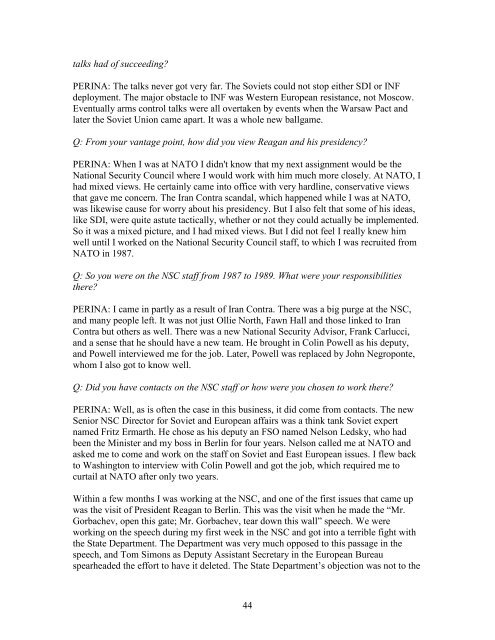ambassador rudolf v. perina - Association for Diplomatic Studies and ...
ambassador rudolf v. perina - Association for Diplomatic Studies and ...
ambassador rudolf v. perina - Association for Diplomatic Studies and ...
You also want an ePaper? Increase the reach of your titles
YUMPU automatically turns print PDFs into web optimized ePapers that Google loves.
talks had of succeeding?<br />
PERINA: The talks never got very far. The Soviets could not stop either SDI or INF<br />
deployment. The major obstacle to INF was Western European resistance, not Moscow.<br />
Eventually arms control talks were all overtaken by events when the Warsaw Pact <strong>and</strong><br />
later the Soviet Union came apart. It was a whole new ballgame.<br />
Q: From your vantage point, how did you view Reagan <strong>and</strong> his presidency?<br />
PERINA: When I was at NATO I didn't know that my next assignment would be the<br />
National Security Council where I would work with him much more closely. At NATO, I<br />
had mixed views. He certainly came into office with very hardline, conservative views<br />
that gave me concern. The Iran Contra sc<strong>and</strong>al, which happened while I was at NATO,<br />
was likewise cause <strong>for</strong> worry about his presidency. But I also felt that some of his ideas,<br />
like SDI, were quite astute tactically, whether or not they could actually be implemented.<br />
So it was a mixed picture, <strong>and</strong> I had mixed views. But I did not feel I really knew him<br />
well until I worked on the National Security Council staff, to which I was recruited from<br />
NATO in 1987.<br />
Q: So you were on the NSC staff from 1987 to 1989. What were your responsibilities<br />
there?<br />
PERINA: I came in partly as a result of Iran Contra. There was a big purge at the NSC,<br />
<strong>and</strong> many people left. It was not just Ollie North, Fawn Hall <strong>and</strong> those linked to Iran<br />
Contra but others as well. There was a new National Security Advisor, Frank Carlucci,<br />
<strong>and</strong> a sense that he should have a new team. He brought in Colin Powell as his deputy,<br />
<strong>and</strong> Powell interviewed me <strong>for</strong> the job. Later, Powell was replaced by John Negroponte,<br />
whom I also got to know well.<br />
Q: Did you have contacts on the NSC staff or how were you chosen to work there?<br />
PERINA: Well, as is often the case in this business, it did come from contacts. The new<br />
Senior NSC Director <strong>for</strong> Soviet <strong>and</strong> European affairs was a think tank Soviet expert<br />
named Fritz Ermarth. He chose as his deputy an FSO named Nelson Ledsky, who had<br />
been the Minister <strong>and</strong> my boss in Berlin <strong>for</strong> four years. Nelson called me at NATO <strong>and</strong><br />
asked me to come <strong>and</strong> work on the staff on Soviet <strong>and</strong> East European issues. I flew back<br />
to Washington to interview with Colin Powell <strong>and</strong> got the job, which required me to<br />
curtail at NATO after only two years.<br />
Within a few months I was working at the NSC, <strong>and</strong> one of the first issues that came up<br />
was the visit of President Reagan to Berlin. This was the visit when he made the “Mr.<br />
Gorbachev, open this gate; Mr. Gorbachev, tear down this wall” speech. We were<br />
working on the speech during my first week in the NSC <strong>and</strong> got into a terrible fight with<br />
the State Department. The Department was very much opposed to this passage in the<br />
speech, <strong>and</strong> Tom Simons as Deputy Assistant Secretary in the European Bureau<br />
spearheaded the ef<strong>for</strong>t to have it deleted. The State Department’s objection was not to the<br />
44
















